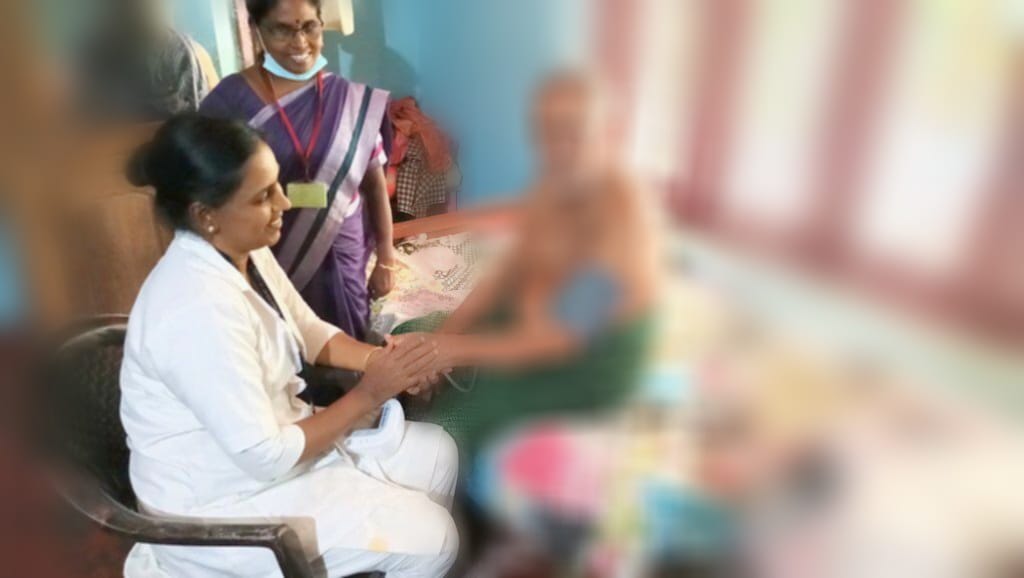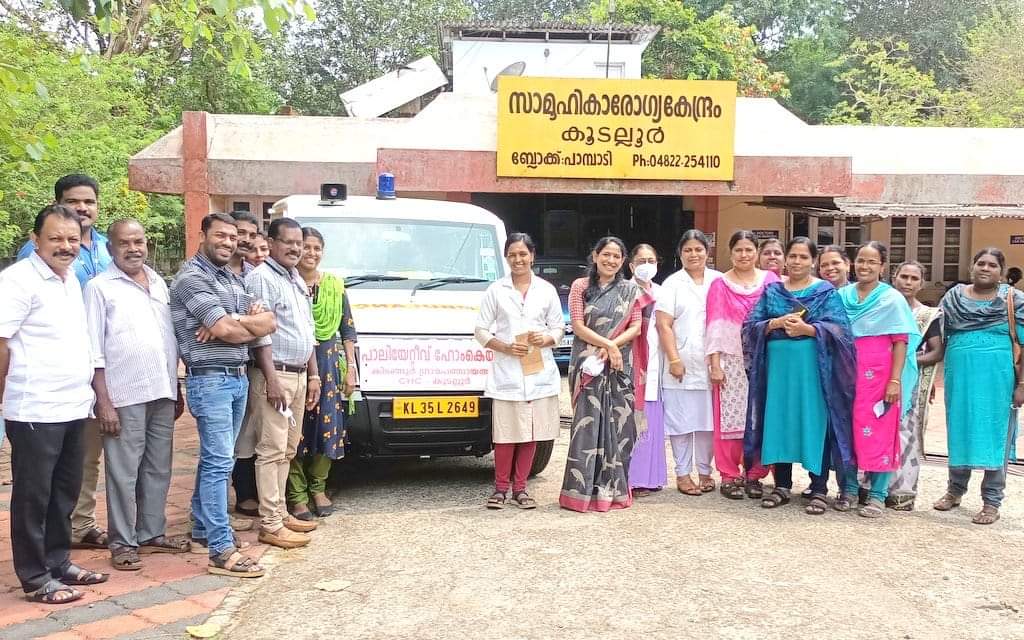Palliative nurses need strong hearts
Sindhu S., End of Life Care advocate and author, writes:
Can someone fall in love with the toughest job on earth – one that also comes with a meagre salary and no job security, retirement benefits, etc.? Strangely, yes.
Sheela Rani Kidangoor, a primary palliative care nurse from Kerala considers it lucky to be among the chosen ones who do home visits and take care of bedridden patients living in dismal health and hygiene conditions in an entire village.
No wonder then that she won the prestigious national Florence Nightingale Award instituted by the Indian Nursing Council in the Auxiliary Junior Public Health Nurse (JPHN) category. Susan Chacko, a government nurse from Kollam, was also selected from the state this year for her outstanding service during the Covid pandemic. Sheela hails from Kottayam district and works with the Kidangoor Panchayat Palliative Care Team and Koodalloor Community Health Centre.
Sheela says she feels blessed to be taking care of patients with life limiting illnesses, though with an unflattering salary and an annual contract, without pension, provident fund or any other benefits government employees customarily have.
Sheela is working as a community nurse for the past 12 years. The palliative care team makes about 150 home visits a month, sometimes meeting eight patients a day. Once they are with the patient, there is absolutely nothing the team doesn’t do ̶ from basic check-ups to washing soiled bed-sheets and bodies, and distributing monetary assistance, air beds or wheel chairs bought out of local donations. “It does drain us, but, at the same time, is spiritually uplifting,” she says.
How do they manage to do the toughest part – cleaning up unwashed mess? She says it’s quite simple. “We imagine ourselves in their place: having to lie in filth for days, weeks or months, with worms crawling over our body. The heart then takes over and the mind knows what to do.”
Sheela says family caregivers are not entirely to be blamed for not taking proper care of the patient. “Many are clueless about care giving. Sometimes adolescent sons find it awkward and unsure to clean up the private parts of an ill mother; they leave it for a woman relative, health worker or volunteer to show up. At times, the carer is too exhausted, making them incapable of taking care of a bedridden patient day in and day out. In some cases, the patient may have been an authoritarian figure in the family dynamic when they were healthier and hence the carer could have a strained relationship or grudges. When we clean up, and show them how and why it had to be done, they mostly get it and step up. We also arrange some monetary assistance to caregivers from donations received from kind-hearted people in the neighbourhood, and that too works as incentive.
Before she took up this job, Sheela did odd jobs: nursing assistant, lab technician and computer teacher, to name a few. She has been a social animator in the Akshaya Centre computer literacy programme where she went around the village teaching basic computer operation to at least one person in each house.
She says a newspaper advertisement for a palliative care nurse for the panchayat palliative care team was a life changer. “There were 14 applicants and they all lost interest when they heard it was a contract job for a year with a monthly salary of Rs 3,000, a job that required home visits to bedridden patients involving a lot of legwork.”
Sheela signed up as she had an inclination to nursing. “I got a chance to be in the first batch at the Palliative Training Centre in Kottayam District Hospital. We (nurses from eight panchayats) were sent for a three-month training, which was where I realised the enormity and seriousness of my work.”
“We visited various palliative home care units in different districts as part of the training, including one in Ernakulam. It was an eye opener. I came across miserable end of life stories tucked away in isolated homes and watched with shock how unsure family caregivers struggled to make sense and deal with health emergencies of patients abandoned by the medical system. The list included the terminally ill, geriatric, cancer, spinal injury and even mentally ill patients, people suffering from chronic diseases and their families. These were heart-wrenching stories, which made my resolve to take up the job even stronger.”
When they started the home visit team (comprised of panchayat representatives and health department staff), there were only a couple of patients to attend to. The team consisted of an Asha worker, a nurse, a couple of volunteers, local representatives, etc. With the help of people’s representatives, Asha activists and health workers, houses of the sick were identified and registered. In the beginning, Asha workers were paid a small allowance from donations received, but later the government started paying them Rs 100 per visit.
“As word spread about the kind of work we did, people started referring and calling up our palliative care team, requesting home visits. The panchayat office was far away from the health centre from where supplies had to be collected. Once we started working as a palliative care team we didn’t have a vehicle to take us around. Our work required a lot of travelling, walking to home care patients. We had an ambulance rented from a charitable institution, to take us around, until we got our own vehicle recently.”
They made people aware of the need to help those with life limiting illness, made them realise the importance of being compassionate. “It taught me that human beings are essentially good.”
“In Kidangoor, our team also organised many awareness classes. Some clubs started their own home care teams, some helped as volunteers or donors. Our panchayat also increased the palliative care budget each year allowing us to provide wheelchairs, cots, back rests, etc to patients in need. There is also a facility in our panchayat to deposit money towards our home care expenses, in a joint account of Panchayat President and Medical Officer, which helps keep home care going and provide financial assistance to needy families during emergencies.”
“One good thing about our work is public support. People prefer to give in kind rather than cash, which is good. They donate clothes, wheelchairs, cots, medicines and groceries. During the pandemic, we continued our home visits and even provided patients and caregivers with books from our local library.” Among donors, one of the most involved was PKV Vanita Library who visited needy families with the team, and sponsored patient needs and distributed food kits during festivals.
There are several unforgettable experiences, but one of the saddest would be what she had witnessed during her training days. “There was this house where a paraplegic patient lived with other family members. Every room of the house was tiled except the one the patient was, and this was filled with sand. This was so the patient could urinate on the sand. Newspapers were provided to pass motion. These were periodically removed and replaced with fresh sand, and newspapers. It was unbelievable. Family members said the patient used to be an unfriendly person and hence no one had any regrets treating thus.”
So the team tries to be proactive whenever possible. “We provide air bed before the patient develops bed sores; encourage families to avoid hospitalisation and to provide quality palliative care at home itself.”
Sheela says her salary has also increased over the years to Rs 18,000 a month; but still job security or retirement benefits are nowhere close. She often worries about her own old age and has insecurities about her future. “I worry about aging, about when I am no longer able to do my job; but I thoroughly love what I do at the moment. The job involves a lot of walking and physical work, including bathing patients who have been lying untouched on the bed for weeks or months, sometimes covered with their own dry faecal matter and urine. At the end of the day, it is exhausting, physically and emotionally.”
Sheela is just one of those hundreds of nurses and ASHA workers who provide an unmatched humanitarian service and derive satisfaction from the grateful smiles of beneficiaries, patients and caregivers. It is about time the government realises their worth, the important role they play in nursing humanity back to life.
Watch: a work-day in the life of Sheela:









Kudos to Sheela Rani and all the nurses and care givers …you are doing outstanding work and be rest assured that you will also get all the love n support. Continue doing your great work and lead us all.